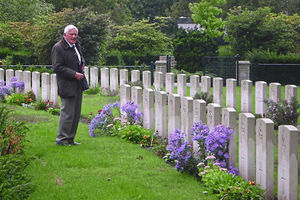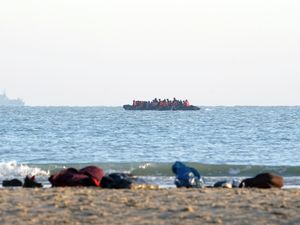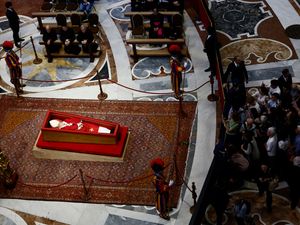Peter Rhodes: The real heroes of a war are those who don't come home
Last month saw the end of UK military operations in Afghanistan. For the first time in many years there are no British boots on the ground in foreign wars.

That is something to give thanks for on Remembrance Day.
Let us hope we see no more homecoming coffins. In July 2009 I was in Wootton Bassett for the repatriation of eight bodies of young soldiers killed in Afghanistan. It was a hard assignment, a cascade of emotions.
Before the eight hearses arrived, I went into the little church to gather my thoughts. In the dim, echoing nave, behind a posy of fresh flowers, I found a plaque with an inscription from the Book of Samuel concerning the age-old covenant between civvies and soldiers: "The men were very good unto us, And we were not hurt. They were a wall unto us, Both by night and day."
The men and women we remember today were part of that wall, taking their place in a mighty bulwark, sometimes thrown up in frantic haste, to preserve our civilisation and protect us from the madness of evil men.
On that day at Wootton Bassett and today as another Remembrance Day arrives, I am reminded of the words, usually attributed to Winston Churchill: "We sleep soundly in our beds because rough men stand ready in the night to visit violence on those who would do us harm."
A century of warfare has required generations of Brits to be trained and hardened into those 'rough men' to defend their nation. They are a dwindling band.
Once a month my local regimental association runs a buffet lunch for the old and bold. (Mind you, the point that war veterans make time and again is that soldiers tend to be old or bold, but not both. The real heroes, they tell you, are the ones who never came home).
Bryan Johnson was at last week's buffet. He is 93 and known to hundreds of former Territorial Army soldiers in the Black Country from his days with the Queen's Own Warwickshire & Worcestershire Yeomanry, which once had a base at the drill hall in Stourbridge. I had known him for years but he never talked to me about his war service until 2005 when, on a battlefield pilgrimage in France, we found ourselves on a blustery cliff-top in Normandy. Behind us, the white-flecked grey of the squally English Channel. In front, the shattered remains of a mighty German bunker.
Here, in a few immortal hours on June 6, 1944, the monstrous anger of the Royal Navy's big guns was unleashed on Hitler's Atlantic Wall. This bunker took a direct hit. Great chunks of concrete and shards of gun barrel still litter the meadow. As the German defences were smashed, British, Canadian and American troops swarmed ashore to begin the liberation of a continent.
Sixty-one years on, the old soldier ran a hand thoughtfully over the cold, massive bulk of the wrecked gun breech. Had he been here before? As soon as I asked the question, it all came pouring out. Old soldiers who never breathe a word to their families about the demeaning, disgusting, terrifying and glorious business of warfare sometimes open up to inquisitive strangers.
Back in 1944 Bryan Johnson was a 23-year-old tank driver, coming ashore with the 5th Royal Tank Regiment in the dangerous hours after D-Day. The narrow lanes of the Normandy Bocage countryside were a nightmare for the tanks. Endless ambushes wore down the nerves.
His luck held for more than a month. On July 18 hundreds of British tanks moved forward in the assault codenamed Goodwood. In the open fields his comrades were picked off like flies by the Germans' formidable 88mm guns.
"It was just slaughter. We lost 400 tanks that day. My co-driver was killed."
By rights Bryan should have died, too. But by one of those miracles of combat, he was adjusting his seat in the tank and suddenly dropped a few inches.
At that moment the shell struck. His co-driver, Aubrey Garrett, was mortally wounded. Aubrey took some time to die.
Bryan did what he could: "His brains were all over the place. It is the only time I have ever administered morphine to a man as he was dying."
As we stood on the clifftop, the old tank driver, now living in Leamington Spa, reflected on the unfairness of it all. In one flash of high explosive Aubrey died but Bryan got another 70 years.
He and his mates won the war, came home and kept their experiences to themselves.
On Remembrance Day they stand in silence with memories too terrible to comprehend. And if they shed a tear, is it any wonder?





